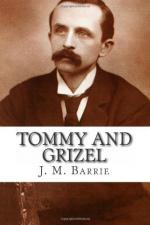According to another authority, T. Sandys got his early modesty from his father, who was of a very sweet disposition, and some instances of this modesty are given. They are all things that Elspeth did, but Tommy is now represented as the person who had done them. “On the other hand, his strong will, singleness of purpose, and enviable capacity for knowing what he wanted to be at were a heritage from his practical and sagacious mother.” “I think he was a little proud of his strength of will,” writes the R.A. who painted his portrait (now in America), “for I remember his anxiety that it should be suggested in the picture.” But another acquaintance (a lady) replies: “He was not proud of his strong will, but he liked to hear it spoken of, and he once told me the reason. This strength of will was not, as is generally supposed, inherited by him; he was born without it, and acquired it by a tremendous effort. I believe I am the only person to whom he confided this, for he shrank from talk about himself, looking upon it as a form of that sentimentality which his soul abhorred.”
He seems often to have warned ladies against this essentially womanish tendency to the sentimental. “It is an odious onion, dear lady,” he would say, holding both her hands in his. If men in his presence talked sentimentally to ladies he was so irritated that he soon found a pretext for leaving the room. “Yet let it not be thought,” says One Who Knew Him Well, “that because he was so sternly practical himself he was intolerant of the outpourings of the sentimental. The man, in short, reflected the views on this subject which are so admirably phrased in his books, works that seem to me to found one of their chief claims to distinction on this, that at last we have a writer who can treat intimately of human love without leaving one smear of the onion upon his pages.”
On the whole, it may be noticed, comparatively few ladies contribute to the obituary reflections, “for the simple reason,” says a simple man, “that he went but little into female society. He who could write so eloquently about women never seemed to know what to say to them. Ordinary tittle-tattle from them disappointed him. I should say that to him there was so much of the divine in women that he was depressed when they hid their wings.” This view is supported by Clubman, who notes that Tommy would never join in the somewhat free talk about the other sex in which many men indulge. “I remember,” he says, “a man’s dinner at which two of those present, both persons of eminence, started a theory that every man who is blessed or cursed with the artistic instinct has at some period of his life wanted to marry a barmaid. Mr. Sandys gave them such a look that they at once apologized. Trivial, perhaps, but significant. On another occasion I was in a club smoking-room when the talk was of a similar kind. Mr. Sandys was not present. A member said, with a laugh, ’I wonder for how long men can be together without talking gamesomely of women?’ Before any answer could be given Mr. Sandys strolled in, and immediately the atmosphere cleared, as if someone had opened the windows. When he had gone the member addressed turned to him who had propounded the problem and said, ‘There is your answer—as long as Sandys is in the room.’”




